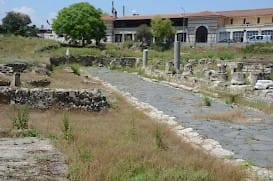
The Mystery of the Thorn in Paul’s Side
For the past 2,000 years, Bible scholars have struggled to answer the question as to what was the ailment Paul referred to as a thorn in his flesh (II Corinthians 12:7)? Was he talking about a physical, mental or interpersonal problem he was struggling with? Some scholars have offered reasonable theories based on Scriptural accounts while others have put forth ridiculous theories that were created to grab headlines and sell books. There are three theories that would initially seem logical.
First, Paul may be talking about his having bouts of arthritis. Anyone who has suffered from this debilitating autoimmune disease would no doubt agree it is like a “thorn in the flesh”. Others have speculated it might have been migraines headaches. This is another condition that feels as if an ice pick is slowly being pushed into a person’s brain leaving them in sheer agony. Finally, there is the idea that Paul was suffering from tinnitus. This is a constant ringing in the ears that has driven some people to harm themselves. It has also been theorized that these last two ailments might have been bought about as the result of one or more of the stoning’s and beatings with rods that Paul endured. In fact, Paul states that one of these stoning may have left him dead, and that he was resurrected back to life (Acts 14:19-20). However, the answer to this age old question is relatively easy to accurately deduce. As always, we will focus on exactly what Scripture, or in this case Paul, has to say concerning his ongoing affliction.

The first time we read that Paul has a medical condition, or a “weakness in the flesh” is in the Book of Galatians. Paul writes, “As you know, it was because of a weakness in the flesh that I first preached the Gospel to you, and even though the test of you was in my flesh {Greek: sarx}, you did not despise me or reject me {Greek: to spit out} with contempt. Instead you welcomed me as if I were an angel of God, as if I was Jesus Christ Himself. Where, then, is your blessing of me now? I can testify that, if you could have done so, you would have torn out your eyes and given them to me” (Galatians 4:13-15). This is an abrupt phrase by Paul and seems to say that the Galatian church members were so kind and compassionate about Paul’s condition that, if they could have, they would have helped him by donating their own eyes. So, Paul appears here to be talking about a physically debilitating condition related to his eyes as this is the only body part he refers to in these verses concerning his weakness in his flesh.

Now, if Paul’s problem concerned his eyes, this would have been seen as no minor worry for him for many reasons. First, the eyes have always been considered the windows to the soul, and also the reflectors of light {good} and darkness {evil}. So, Paul was spreading the love of God through Christ but was displaying a condition that was thought to be caused by God as a curse on a person. Second, there was a belief at this time and continues to this day that a person could be cursed if someone with certain powers were to cast the evil eye on them. The only way to break this curse was for the person to spit and turn away. So, Paul would have been seen by some as having an evil eye curse on him which would in turn reflect on the power of Jesus to protect one his own. This would be seen as an embarrassing health issue and contrary to the good health and protection that one would assume Christ would give to his Apostles.
Then, if we go to the end of Galatians we read, “See with what large letters I write with my own hand” (Galatians 6:11). So, why would a person need to write in overly large print? Obviously it is a person with very weak eyesight. We also learn in reading his second letter to the Thessalonian Church that Paul now begins to customarily close his letters by writing a few lines in his own hand (II Thessalonians 3:17).
So, it is clear that Paul is using a scribe to write down his thoughts and advice to the churches he has founded. This scribe is thought to have been the physician Luke. It is also believed that Luke wrote the Book of Acts to help Paul better plead his case in Rome while under house arrest. Then, at the end of his letters, Paul would now personally write a short final blessing and sign them in his own hand. He was forced to do this as there were those who sought to denigrate Christian doctrine in the first century by forging letters in the name of Paul. But why would Paul need a scribe? Was he incapable of organizing and composing a long letter that covered a variety of topics?

Paul wrote that before his conversion to Christianity, he was a “Jew or Hebrew among Jews” (Philippians 3:5-6). Paul was born in the metropolitan city of Tarsus and came from a wealthy Jewish family (Acts 21:39). He had the rare rights and privileges of Roman citizenship, and was sent to Jerusalem to be schooled in the Temple by the revered rabbi, Gamaliel (Acts 22:3). This was a great honor and reserved for only the brightest Jewish students. So Paul had the finest upbringing, education, was a scholar in the Jewish Law, and was apparently a successful business man. Therefore, the only explanation that one could draw as to why Paul needed a scribe was because of the loss of his eyesight. This might have been due to the natural ageing process, or because of an accident, or perhaps an eye disease. But in any case, it is clear that Paul had begun the slow process of losing his eyesight, and this eventually caused him to fear his ability to travel, preach and most importantly, represent Jesus the Christ who provides peace and health to His followers. This is why Paul needed a loyal scribe with a steady hand, good penmanship and the necessary skill to quickly take down dictation. In this way, whether Paul was in prison, or incapable of traveling, he could still relay his thoughts and advice to his various churches concerning authentic early church doctrine. And Paul was very important to the Jesus as Messiah movement as Peter famous wrote just before his execution that, after he was gone, his followers should turn to Paul for advice (II Peter 3:14-16).
Now let’s look closer at II Corinthians. Here Paul engages in mock boasting about his inabilities, a thing that ancient people did not brag about. Paul clearly states that he will boast in the things that show his physical “weakness”. Here he states, “I will {now} come to visions and revelations from the Lord. I know a man in Christ who more than fourteen years (whether in the body {raptured} I cannot tell; or whether out of the body {spiritually}, I cannot tell: {Only} God knows;) such a one {was} caught up to the Third Heaven. And I know such a man, (whether in the body, or out of the body, I cannot tell: Only God knows;) How that he was caught up into Paradise {Heaven} and heard unspeakable words, which is not lawful {permitted} for a man to utter."(II Corinthians 12:1-4) Paul is clearly referring to one of his own experiences that he has put in the third person so as to convey the understanding to the reader that he is not boasting about this event. But he was saying that this particular stoning was so severe, that may have killed him. And in this state, left for dead, he found himself in Heaven but was not given permission to share what he heard. Paul was later revived or resurrected while his followers were in the process of disposing of his body (Acts 14:19-20; 22:4; II Corinthians 12:3-4).

Now, here is what is so peculiar. Paul starts off saying he is about to relate a vision and its accompanying revelations. But he then goes on to say absolutely nothing about seeing anything when he is caught up into the Third Heaven. This would be the Heaven from which God rules Creation. Paul states he only heard things. We see a similar situation like this with the Apostle John who, in the Book of Revelation, states he both saw things and heard revelations (Revelation 4: 1-3).
And then Paul goes on to state in the following verses that he is experiencing an ongoing "stake" {Greek: skolops} in his flesh. This is a Greek word that refers to any pointed object that causes pain. So, we can now be sure that Paul is not referring to a spiritual or interpersonal problem he is dealing with. Paul goes on to say that he had repeatedly prayed that this stake be removed, but that the response from Christ was, “My grace is sufficient for you; My power is made perfect in your weakness.” (II Corinthians 12:9) In other words, Jesus is showing His power to the gentile world through His use of Paul in his current weakened physical state.

It is clear that Paul’s problem had to do with his eyes. Whether he had an ongoing infection of some kind, or cataracts, or was experiencing just the natural degeneration of vision that comes with ageing, Paul’s eyesight was definitely getting worse and it worried him. This would be seen as a major problem for a man who was personally appointed by Jesus to serve as a Christian Apostle, visionary, prophet, and leader in the early Christian church outreach movement to the gentile world. He was shown a vision that he could not relate because it was a blur. He could only reference Jewish doctrine that he could no longer study. He could give speeches and sermons but could not refer to notes. He could receive countless letters from followers concerning Church doctrine, but could not personally read and answer them. He could now be reasonably seen by some as the wrong man for the wrong job. He was tasked to take the Gospel to the entire world where appearance, presence, first impressions, oral rhetoric and powerful authority were all major parts of what was expected by the public. While he was bitter about his physical failure at this pivotal moment in the Church movement, Jesus would use him in such a way that he would ultimately become revered as a major Apostle. Over the course of thirteen years, he would travel over seven thousand miles, write fourteen of the twenty seven Books that compose the New Testament, and personally found fourteen churches that would in turn grow to produce six more.

On a closing note, when we first hear of Paul in Scripture, he is a proud, sanctimonious Jew determine to stamp out the Christian movement wherever it may rear its ugly head. On the road to Damascus to arrest the leaders of a church located there, he sees, hears and talks with Christ. He is temporarily blinded because he tries to look directly at Christ in His beatific state. He remained blind for three days, then we are told his sight is restored (Acts 9:1-9). However, Scripture does not state that he was given 20/20 vision. Only that he was completely bind then he “received sight”. We might assume that Paul was intentionally left with partial vision to constantly remind him that he is now on a mission from God. And as such, his creature comforts including perfect sight, health and safety are not a prerequisite nor a priority. In fact, they could actually be a hindrance in keeping Paul a humble servant of the Lord. Thus, his prayers in this area were heard, but not granted for good reason.
If you enjoy the information provided on this site, please consider making a donation of any amount to help continue its production. Donate Now